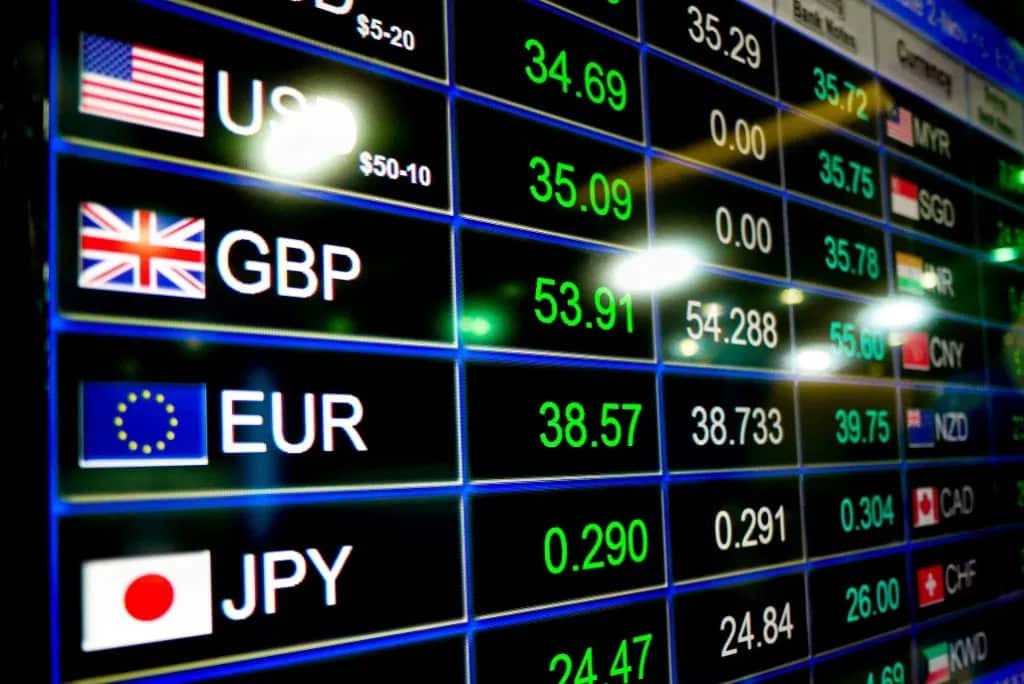Foreign exchange market best definition – The foreign exchange market, often known as the forex market, is the global marketplace where currencies are traded. It is the largest and most liquid financial market in the world, with a daily trading volume of trillions of dollars. In this market, individuals, businesses, and financial institutions exchange currencies for a variety of reasons, including international trade, investment, and speculation.
The forex market operates 24 hours a day, five days a week, and it involves a wide range of participants, including central banks, commercial banks, investment banks, hedge funds, and retail traders. These participants trade currencies in order to facilitate international payments, manage risk, and speculate on currency price movements.
Definition of Foreign Exchange Market
The foreign exchange market, also known as the forex market, is a global decentralized market for the trading of currencies. It is the largest financial market in the world, with an average daily trading volume of over $5 trillion.
Concept of Foreign Exchange (Forex) Market
The forex market allows individuals, businesses, and financial institutions to exchange currencies for various purposes, such as international trade, investment, and speculation. It operates 24 hours a day, 5 days a week, across different time zones, making it accessible to participants worldwide.
Participants in the Foreign Exchange Market
The foreign exchange market is a global decentralized marketplace where currencies are traded. Various entities participate in this market, each playing a specific role in facilitating currency exchange and influencing market dynamics.
Central Banks
Central banks are financial institutions responsible for managing a country’s monetary policy and regulating the financial system. They participate in the forex market to:
- Manage foreign exchange reserves
- Influence the value of their domestic currency
- Intervene to stabilize the forex market during periods of volatility
Commercial Banks
Commercial banks are financial institutions that provide banking services to individuals and businesses. They play a significant role in the forex market by:
- Facilitating currency exchange for their clients
- Providing foreign exchange services such as hedging and risk management
- Participating in the interbank market to trade currencies among themselves
Other Financial Institutions
Other financial institutions involved in the forex market include:
- Investment banks
- Hedge funds
- Money brokers
- Asset managers
These institutions participate in the forex market to:
- Manage currency risk
- Speculate on currency movements
- Provide liquidity to the market
Factors Influencing Foreign Exchange Rates
The foreign exchange market is a complex and dynamic environment where exchange rates are constantly fluctuating. Several factors influence these fluctuations, including economic indicators, political events, and market sentiment.
Economic Indicators, Foreign exchange market best definition
- Gross Domestic Product (GDP): GDP measures the total value of goods and services produced in a country. A strong GDP indicates a healthy economy and can lead to a stronger currency.
- Inflation: Inflation measures the rate at which prices for goods and services increase. High inflation can erode the value of a currency, making it less desirable to hold.
- Interest Rates: Interest rates set by central banks influence the cost of borrowing and lending. Higher interest rates can attract foreign investment, leading to an appreciation of the currency.
- Trade Balance: The trade balance measures the difference between a country’s exports and imports. A positive trade balance indicates that a country is exporting more than it imports, which can strengthen its currency.
Political Events
Political events can also significantly impact foreign exchange rates. For example, political instability, elections, and changes in government policies can create uncertainty and lead to currency fluctuations.
Market Sentiment
Market sentiment refers to the overall attitude of market participants towards a particular currency. Positive sentiment can lead to increased demand for a currency, resulting in its appreciation, while negative sentiment can lead to depreciation.
Finish your research with information from foreign exchange rate in pakistan open market today.
Types of Foreign Exchange Transactions

Foreign exchange transactions involve the exchange of currencies between two parties. These transactions can be classified into different types based on their purpose, timing, and underlying instruments.
The most common types of foreign exchange transactions include spot transactions, forward transactions, and swaps.
Spot Transactions
Spot transactions are the most basic type of foreign exchange transaction. They involve the immediate exchange of currencies at the prevailing market rate.
Spot transactions are typically settled within two business days of the trade date. They are used for immediate settlement of international payments, such as those for imports and exports.
Forward Transactions
Forward transactions are contracts to exchange currencies at a specified future date and rate.
Forward transactions are used to hedge against currency fluctuations. They allow businesses and individuals to lock in an exchange rate for a future transaction, protecting them from potential losses due to adverse currency movements.
Swaps
Swaps are agreements to exchange currencies and interest payments over a specified period.
Swaps are used for a variety of purposes, including hedging against currency and interest rate risk, speculating on currency movements, and generating income.
Risks and Challenges in the Foreign Exchange Market
The foreign exchange market is a dynamic and complex environment, and there are several risks and challenges associated with trading in it. These include currency fluctuations, leverage, and counterparty risk.
Do not overlook explore the latest data about news market forex hari ini.
Currency fluctuations are a major risk in the foreign exchange market. The value of currencies can fluctuate rapidly, and this can lead to losses for traders. For example, if a trader buys a currency pair and the value of the base currency falls, the trader will lose money.
Notice advantages and disadvantages of the foreign exchange market for recommendations and other broad suggestions.
Leverage is another risk in the foreign exchange market. Leverage allows traders to trade with more money than they have in their account. This can magnify both profits and losses. For example, if a trader uses 10:1 leverage and the value of the currency pair they are trading falls by 1%, they will lose 10% of their account balance.
Counterparty risk is the risk that the other party to a trade will not fulfill their obligations. This can be a major risk in the foreign exchange market, as there are many unscrupulous brokers and traders.
Currency Fluctuations
- The value of currencies can fluctuate rapidly, and this can lead to losses for traders.
- Currency fluctuations can be caused by a variety of factors, including economic data, political events, and natural disasters.
- Traders should be aware of the risks of currency fluctuations and should take steps to mitigate these risks.
Leverage
- Leverage allows traders to trade with more money than they have in their account.
- This can magnify both profits and losses.
- Traders should use leverage carefully and should be aware of the risks involved.
Counterparty Risk
- Counterparty risk is the risk that the other party to a trade will not fulfill their obligations.
- This can be a major risk in the foreign exchange market, as there are many unscrupulous brokers and traders.
- Traders should only trade with reputable brokers and should take steps to mitigate the risks of counterparty risk.
Importance of the Foreign Exchange Market: Foreign Exchange Market Best Definition

The foreign exchange market, also known as the forex market, plays a crucial role in global trade and finance. It serves as a platform for exchanging currencies and facilitates international payments and investments.
Facilitating International Trade
The forex market enables businesses to conduct cross-border transactions by exchanging currencies. This is essential for international trade, as companies need to convert their local currency into the currency of the country they are importing or exporting from. The forex market provides the liquidity and exchange rates necessary for these transactions.
International Investments
The forex market also plays a vital role in international investments. Investors often diversify their portfolios by investing in assets denominated in different currencies. The forex market allows them to convert their domestic currency into foreign currencies to make these investments. Additionally, the forex market provides opportunities for currency speculation, where investors can profit from fluctuations in exchange rates.
Ultimate Conclusion

The foreign exchange market is a complex and dynamic environment that plays a vital role in the global economy. It facilitates international trade and investment, and it provides a mechanism for managing currency risk. However, it is also a market that is subject to a variety of risks, including currency fluctuations, leverage, and counterparty risk. As such, it is important for participants in the forex market to understand these risks and to trade prudently.
